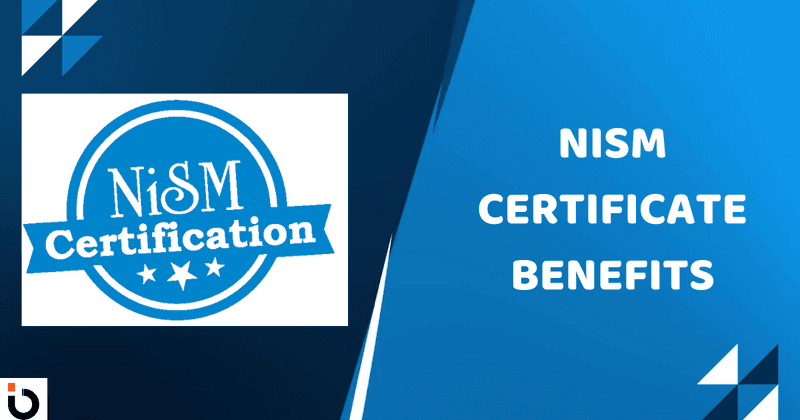If you’re interested in a job in the stock markets and are always on the lookout for courses, the NISM certification course may be the right fit for you. It’s a great way to get your foot in the door of the financial industry.
In this blog, we’ll cover every aspect of earning your NISM credential. Continue reading!
Table of Contents
ToggleWhat is NISM?
The National Institute of Securities Markets (NISM) is a public trust established in 2006 by the Securities and Exchange Board of India (SEBI), the regulator of the securities markets in India.
What is NISM Certification?
The NISM full form is the National Institute of Securities Markets. Since 2006, the Securities Exchange Board of India (SEBI) has made great strides in India to improve the quality of financial education via its educational arm, the NISM.
The National Institute of Financial Management aids Indian market players in attaining the necessary degree of financial knowledge. Because of this, they are better able to assist everyone interested in the capital markets with their needs and give the necessary activities.
In order to assist investors in making wise financial choices, NISM offers a number of courses and certificates that may be obtained by interested parties.
It provides certificates and training for several industries and professions. The purpose of this guide is to help everyone interested in the Indian stock markets become more informed investors.
Is Your Resume ATS- Friendly?
Check: Free ATS Resume Checkers
NISM Course Details
Famous NISM offerings are as follows:
1. National Institute for Standards and Technology (NIST) Series V Part A Certification Exam for Mutual Fund Distributors
NISM Version A: Passing the Mutual Fund Distributors Certification Exam on Your Very First Attempt! There is a streamlined process of getting ready for the NISM test. Some centers offer straightforward Hindi-English mix explanations which are the course’s unique selling point.
2. Preparation for the National Institute of Securities Markets Level A Certification Exam for Mutual Fund Distributors (in Telugu)
There are accreditations geared toward bettering the mutual fund industry’s sales, distribution, and ancillary support services.
Students taking this course will be well-prepared to take the Telugu version of the NISM Series VA: Mutual Fund Distributor Certification Exam.
Eligibility for NISM Certification
The Securities and Exchange Board of India requires the National Institute for Securities Markets to provide certification exams to anyone involved in the securities market (SEBI).
However, the test is open to everyone with an interest in the Indian Securities Markets.
There is no minimum age limit or required level of education to sit for the NISM test.
Suggested Read: How to face an Interview
How to Get NISM Certificate?
How can I get my hands on that NISM certificate? is a query that’s been running rampant through the minds of candidates recently. Here, we’ll go over everything you need to know to get your NISM certification.
How to register for a NISM certification exam?
- First things first: register for an account on the NISM homepage.Second, decide the course section you want to enroll in and sign up for that.
- Test date, time, and location must be chosen in Step 3 of the registration process for each individual module exam.
- Fourth, send in your payment.
- After making a payment, you’ll be given access to a digital copy of the course materials and a virtual hall ticket in your NISM account.
- The sixth step is to print off a copy of your hall ticket and bring it with you to the testing facility on the day of the exam.
Instructions for Taking the NISM Certification Exam (Official Registration and Enrollment Form)
How many different Types of NISM certifications are available?
|
SEBI Investor Certification Examination
|
NISM Certification fee
NISM test fee ranges from 0 to INR 6000.
If you don’t have time to take the test or don’t pass it the first time, you’ll have to pay the whole registration price again to take it the next time.
|
Sr.
|
NISM Exam
|
Test Duration
|
Fees (Rs)
|
Maximum Marks
|
No. of Questions
|
Pass Mark (%)
|
Negative Marks (%)
|
Certificate Validity(in years)
|
|
No
|
||||||||
|
1
|
1hr
|
Free
|
50
|
50
|
50
|
–
|
2
|
|
|
2
|
2hrs
|
1500/-
|
100
|
100
|
60
|
25
|
3
|
|
|
3
|
2hrs
|
1500/-
|
100
|
100
|
50
|
25
|
3
|
|
|
4
|
2hrs
|
1500/-
|
100
|
100
|
50
|
25
|
3
|
|
|
5
|
2hrs
|
1500/-
|
100
|
100
|
60
|
25
|
3
|
|
|
6
|
2hrs
|
1500/-
|
100
|
100
|
60
|
25
|
3
|
|
|
7
|
2hrs
|
1500/-
|
100
|
100
|
50
|
–
|
3
|
|
|
8
|
2hrs
|
1200/-
|
50
|
50
|
50
|
–
|
3
|
|
|
9
|
2hrs
|
1500/-
|
100
|
100
|
60
|
25
|
3
|
|
|
10
|
2hrs
|
1500/-
|
100
|
100
|
50
|
25
|
3
|
|
|
11
|
2hrs
|
1500/-
|
100
|
100
|
60
|
25
|
3
|
|
|
12
|
2hrs
|
1500/-
|
100
|
100
|
60
|
25
|
3
|
|
|
13
|
3 hrs
|
3000/-
|
150
|
135
|
60
|
25
|
3
|
|
|
14
|
3 hrs
|
3000/-
|
150
|
120
|
60
|
25
|
3
|
|
|
15
|
2hrs
|
1770/-
|
100
|
100
|
60
|
–
|
3
|
|
|
16
|
3hrs
|
3000/-
|
150
|
150
|
60
|
25
|
3
|
|
|
17
|
2hrs
|
1500/-
|
100
|
100
|
60
|
25
|
3
|
|
|
18
|
2hrs
|
1500/-
|
100
|
100
|
60
|
25
|
3
|
|
|
19
|
2hrs
|
1500/-
|
100
|
100
|
60
|
25
|
3
|
|
|
20
|
2hrs
|
1770/-
|
100
|
100
|
60
|
25
|
3
|
|
|
21
|
2hrs
|
1770/-
|
100
|
100
|
60
|
25
|
3
|
|
|
22
|
3hrs
|
3000/-
|
150
|
120
|
60
|
25
|
3
|
|
|
23
|
2hrs
|
1500/-
|
100
|
100
|
60
|
25
|
3
|
|
|
24
|
3 hrs
|
3000/-
|
150
|
120
|
60
|
25
|
3
|
|
|
25
|
2hrs
|
1770/-
|
100
|
85
|
60
|
25
|
3
|
|
|
26
|
2 hrs
|
1770/-
|
100
|
100
|
60
|
25
|
3
|
|
|
27
|
2hrs
|
5900/-
|
100
|
90
|
60
|
25
|
–
|
|
|
28
|
2hrs
|
5900/-
|
100
|
90
|
60
|
25
|
–
|
|
|
29
|
2hrs
|
5900/-
|
100
|
90
|
60
|
25
|
–
|
Please check company’s website for the lates fee.

What Is the Procedure for Taking the NISM Exam?
Through its network of Test Administrators, NISM offers Certification Exams in more than 150 different locations throughout India. You must follow these steps to register for and take the NISM Certification Exams.
- Sign up for NISM now by visiting https://certifications.nism.ac.in/ and filling out the required information. Your identity and contact information must be verified.
- Follow the instructions given to the email address you used to create the account and click the activation link. Within 72 hours, your account will be checked for legitimacy.
- After your account has been verified, you may enroll for the exam by logging in using the email address and password you used to create your account on the NISM Certification Portal.
- Select the desired exam, city, test center, exam date, and testing time slot, and then pay for the test online. You’ll get your entry pass when you pay for it.
- The next step is to bring your Aadhar card and another form of identification to the designated testing center (PAN Card, Aadhar Card, Passport, or Driving License)
NISM Certificate Benefits
Reasons to take the NISM Certification Exam
- SEBI is behind both the examinations and the school. This has led to their widespread recognition among banks and other financial organizations.
- Your resume will shine with the addition of the NISM certification. A higher probability of finding employment in the financial sector is associated with possessing these skills.
- NISM’s study guides are all-encompassing and excellent. Without any other aid, it helps potential candidates get ready for the test and do well on the day of the exam.
- The cost of these classes is far lower than that of comparable programs for financial experts. The typical cost of a NISM training program is between Rs 1500 and Rs 3000.
- No one is limited in any way. Anyone, regardless of their educational background, is welcome to take the exam. Just a healthy dose of interest and a hunger for knowledge in the fascinating field of finance will do.
Suggested Read: How to write finance resume
6 Reasons why you should get your NISM certification.
It is recognized by all stock market-related organizations throughout the country, including brokers, banks, investment banks, asset management firms, and more.
- The primary reason why NISM accreditation is respected throughout the country is that it has the support of SEBI, the government agency responsible for regulating the stock market.
- Second, it’s a great addition to your CV if you’re looking to get into the finance industry.
- Capital market jobs at any asset management firm or brokerage firm need NISM certification as a prerequisite for employment. It also reassures businesses that the applicant is well-versed in the stock market. Offers test preparation resources. There are many subtopics within the broad realm of the stock market. Earning this certification will demonstrate to employers that you have mastered the material.
- When you sign up for an exam via NISM, you’ll get a study guide containing information on the securities market, including laws and regulations, topic-by-topic chapters, and relevant examples and illustrations.
- The National Institute for Securities Markets (NISM) accreditation is highly sought after because of the extensive understanding of the securities industry it provides.
- When getting ready for the NISM certification exam, you may use NISM’s own simulated exam as a practice tool. These practice exams are quite useful since the questions they include are comparable to those on the real certification test.
You shouldn’t have too much trouble on the actual test if you put in the time practicing.
NISM Exam Syllabus:
In order to qualify for the NISM Exam, it is necessary for the personnel to understand the whole NISM Examination Syllabus. The following are the topics included in the NISM Curriculum.
I. Investment Landscape
- Understand the parameters of the Indian Economy: Describe Investors and their Financial Goals
- Understand Savings and Investment
- Discuss Different Asset Classes
- Understand the Classification of Investment Risks
- Explain Risk Measures and Management Strategies
- Understand Behavioral Biases in Investment Decision Making
- Understand Risk Profiling
- Explain the Asset Allocation
- Comparison between the two approaches – Do-it-yourself and Taking Professional Help
II. Concept & Role of a Mutual Fund
- Explain the Concept of Mutual Fund
- Understand the Classifications of Mutual Funds
- Describe the Growth of the Mutual Fund Industry in India
III. Legal Structure of Mutual Funds in India
- Describe the Structure of Mutual Funds in India
- Understand the Key Constituents of a Mutual Fund
- Understand the Organisation Structure of Asset Management Company
- Understand the Role and Support Functions of Service Providers of Mutual Funds
- Explain the Role and Function of AMFI
IV. Legal and Regulatory Framework
- Describe the Role of Regulators in India
- Discuss the Role of Securities and Exchange Board of India
- Know the Due Diligence Process Followed by AMCs for Distributors of Mutual Funds
- Explain Investor Grievance and Redressal Standards (Explain about SCORES)
- Understand the AMFI Code of Conduct for Intermediaries
V. Scheme-Related Information
- Understanding the Mandatory Documents and their Purpose, Objective, and Significance
- Explain the Non-Mandatory Disclosures
VI. Fund Distribution and Channel Management Practices
- Explain the Role and Importance of Mutual Fund Distributors
- Understand the Classification of Mutual Fund Distributors
- Explain the Modes of Distribution
- Understand the Pre-requisites to Become a Distributor of the Mutual Fund
- Explain Revenue for a Mutual Fund Distributor
- Know the Commission Disclosure mandated by SEBI
- Explain the Due Diligence Process by AMCs for Distributors of Mutual Funds
- Discuss Nomination Facilities to Agents / Distributors and Payment of Commission to Nominee
- Explain About Change of Distributor
VII. Net Asset Value, Total Expense Ratio, and Pricing of Units
- Discuss the Fair Valuation Principles
- Compute Net Assets of a Mutual Fund Scheme and NAV
- Explain Dividends & Distributable Reserves
- Know about the Concept of Entry and Exit Load and its Impact on NAV
- Know about the Key Accounting and Reporting Requirements Applicable to Mutual Funds
- Know about the NAV, Total expense ratio, and Pricing of units for the Segregated Portfolio
VIII. Taxation
- Understand the Applicability of various taxes in respect of Mutual Funds
- Understand about Capital gains, Capital gains (Long term & Short term) tax and Indexation.
- Understand about the Dividend Income and Dividend Income tax
- Understand the Difference Between dividend distribution tax and capital gains tax
- Understand the basics of Setting off Gains and Losses under Income Tax Act
- Understand about Securities Transaction Tax
- Understand about Tax benefits under Section 80C of the Income Tax Act for investments pertaining to Mutual Funds
- Understand about Tax Deducted at Source (TDS) in Mutual Funds
- Understand the Applicability of GST in Mutual Funds
IX. Investor Services
- Describe the NFO Process
- Explain about the New Fund Offer Price /ongoing price for the subscription
- Discuss Different types of investment plans and options
- Explain how the mutual fund units are allotted to the investor
- Describe the content and periodicity of the Statement of Accounts for investments
- Describe different types of Mutual Fund Investors
- Explain how to fill in the application form for Mutual Funds
- Describe the financial transactions with Mutual Funds (Purchase, Redemption and Switches)
- Explain Cut-off time and Time Stamping
- Describe the KYC requirement for mutual fund investors
- Explain the different types of systematic transactions
- Explain the operational aspects of systematic transactions
- Explain Non – Financial Transactions in Mutual Funds
- Discuss change in the Status of Special Investor Categories
- Explain Investor Transactions – turnaround times
X. Risk, Return and Performance of funds
- Understand the General and Specific Risk Factors
- Explain the Factors that affect mutual fund performance
- Describe Drivers of Returns and Risk in mutual fund Scheme
- Understand the Measures of Returns
- Know about the SEBI norms regarding the representation of returns by Mutual Funds in India
- Explain risks in fund investing with a focus on investors
- Understand the Measures of Risk
- Explain certain provisions with respect to Credit Risk
XI. Mutual Fund Scheme Performance
- Explain the concept of Benchmarks
- Compare Price Return Index and Total Return Index
- Identify the basics of choosing an appropriate performance benchmark
- Describe the use of market benchmarks to evaluate Equity Fund Performance
- Describe the use of market benchmarks to evaluate Debt Fund Performance
- Describe the use of market benchmarks to evaluate Other Schemes
- Explain Quantitative Measures of Fund Manager Performance
- Define Tracking Error
- Understand the different Sources for disclosure of scheme performance (Scheme documents, AMFI and AMC website and Fund Fact Sheet)
XII. Mutual Fund Scheme Selection
- Explain Scheme Selection based on Investor needs, preferences and risk-profile
- Explain Risk Levels in mutual fund schemes
- Explain Scheme Selection based on the investment strategy of Mutual Funds
- Explain the Selection of Mutual Fund schemes offered by different AMCs or within the scheme category
- Know about selecting options in mutual fund schemes
- Know about Do’s and Don’ts while selecting mutual fund schemes
Common Questions About NISM Certification Tests
Is the National Institute of Safety Management exam is open to anybody?
Anyone with an interest in the Indian Securities Markets may register to take the test. The National Institute of Safety Management (NISM) test has no prerequisites in terms of age or academic level.
When does a candidate’s enrolment become invalid?
A Candidate’s exam registration is valid for 180 days from the date of registration.
How to prepare for the test?
After enrolling and paying for a test, a candidate would get access to the digital study materials in the form of a downloadable PDF. The NISM certification test does include information from the given study guide, however, NISM can not promise that every question will come from the guide. Candidates are cautioned to review any rules that may have been updated after they last took an exam.
Is it possible to change an exam’s scheduled date and time at the candidate’s request?
The NISM Online Certification System does permit one test time change request, provided it is submitted at least 15 days before the scheduled exam date.




